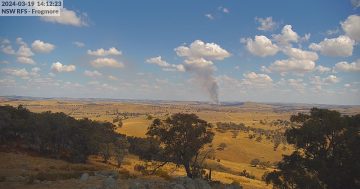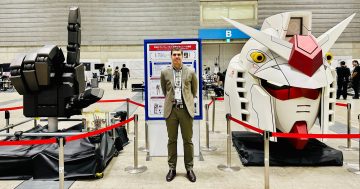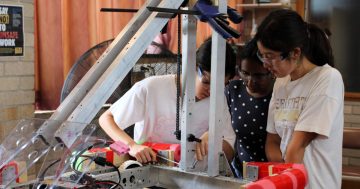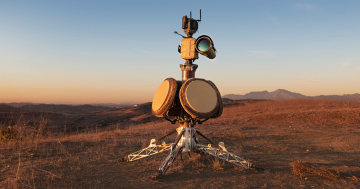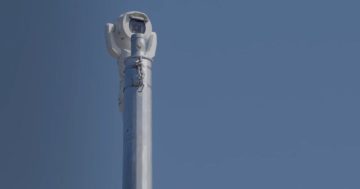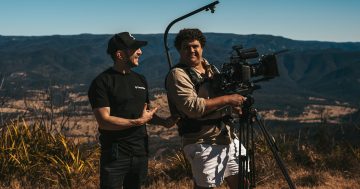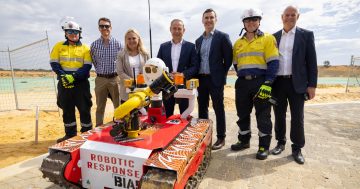Andrew Westrope* says a portable, smartphone-controlled reconnaissance robot has been launched to give first responders enhanced situational awareness in dangerous conditions.
 At a time when sensors are small enough to be mounted anywhere and even smartphones come with 12-megapixel cameras, it’s become hard to justify sending first responders into dangerous situations blind.
At a time when sensors are small enough to be mounted anywhere and even smartphones come with 12-megapixel cameras, it’s become hard to justify sending first responders into dangerous situations blind.
At least that’s the pitch from the folks behind Company Six, a Colorado-based company that unveiled its first product this week — a one-pound, remote-controlled robot mounted with a camera and sensors to give an extra set of eyes and ears to people with dangerous jobs.
Company Six has been teasing the announcement since it spun out of Sphero, a company that makes toys and learning tools for children, in May.
The robot is called ReadySight, and according to Company Six’s website, it comes equipped with an array of sensors and tools for situational awareness: a high-definition camera with a 120-degree field of view and low-light capabilities, a microphone with noise cancellation, an accelerometer, a gyroscope, a motion sensor, an ambient light sensor, a wireless radio with LTE and WCDMA connectivity, a flood lamp, and the ability to record 10 hours of HD video and store it offline.
The robot can stream video to multiple devices at once from unlimited range, and eventually it will be able to connect to both FirstNet and Verizon’s designated first responder networks.
It’s controlled by the user’s smartphone and can stream live video to an unlimited number of Web viewers.
The company’s co-founder Damon Arniotes told Government Technology that ReadySight is a “throwable,” cylindrical robot about the size of a 16-ounce can, the idea being that it’s portable — and potentially disposable — enough to be deployed not only into dangerous environments but other situations where another set of eyes would help.
“We’re focusing on the everyday. Obviously there are situations where you can imagine you might want to send one of these things in instead of a person, but there’s also a lot of things that happen day to day,” he said.
“The goal is to have this on somebody all the time … If I’m going to get on the roof, it’s just a little bit safer, and agencies are happier with the speed and accuracy if you just send the robot up there.
“Besides that, it’s also for tight spaces or keeping an eye on things.”
Company Six CEO Jim Booth said the product is made as a companion for first responders such as police, EMS, search and rescue, and other people who have hazardous jobs.
“As we’ve talked to users, unknown spaces are critical. If there’s a door ajar at a Costco in the middle of the night for instance, rather than put yourself in harm’s way, you can use our robot,” he said.
“If you need to monitor a crime scene and free officers up to do more important tasks, it can do that.
“You can put it in sentry mode and it can wake up and recognise things that are going on.”
Booth said the last decade of innovation in several technical areas made ReadySight possible, including camera technology, battery density, antennas, miniaturised sensors that can fit on a circuit board, LTE and cloud capabilities.
The military has been using reconnaissance robots for years, he said, but the ability to make them small and cheap enough to be everyday companions is relatively new.
“A tool like ReadySight is what we’ve been wanting for years — a low cost, expendable, throwable video robot that runs over the cellular LTE network,” said John Abbey, retired chief of police from Silicon Valley, in a public statement. “ReadySight is a game changer for these situations where more information is needed quickly.”
Expected to start shipping in the third quarter of 2021, the robot is priced in the hundreds of dollars, rather than thousands, because it’s supposed to be a disposable tool for regular use rather than a once- or twice-a-year elite bomb squad asset, Booth said.
And such will be the company’s focus moving forward.
“If we’re going to really focus on providing users with technology for safety, what are those sensors, what are those tools that we can give them?” he said. “This is our first of a suite of products we’ll be looking at in the future.”
*Andrew Westrope is a staff writer for Government Technology.
This article first appeared at govtech.com.


